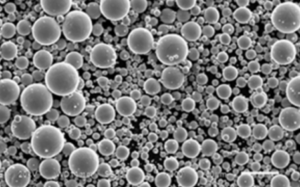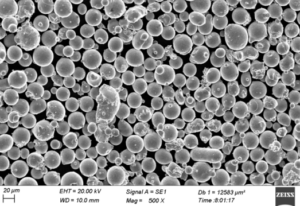مقدمة: لماذا يعتبر المسحوق الكروي مغيرًا لقواعد اللعبة في التصنيع الحديث
تخيل محاولة ملء برطمان بالرخام والحصى. تنزلق الرخام الملساء والمنتظمة في مكانها دون عناء، تاركةً أقل قدر من الفجوات. والآن، تخيل أن تفعل الشيء نفسه مع حصى غير منتظمة الشكل. ستجد صعوبة في تعبئتها بإحكام، أليس كذلك؟ هذا هو المبدأ الكامن وراء مسحوق كروي-جسيمات صغيرة ومتناسقة تتدفق وتعبأ بكفاءة، مما أحدث ثورة في الصناعات من الفضاء إلى الهندسة الطبية الحيوية.
في هذه المقالة، سنتعمق في عالم المسحوق الكروي. سنستكشف أنواعه المختلفة، ونتعمق في خصائصه الفريدة، ونناقش سبب كونه المادة المفضلة للتصنيع عالي الدقة. كما سنقارن أيضًا بين النماذج المختلفة، ونوضح استخداماتها المحددة، ونرشدك إلى إيجابيات وسلبيات كل منها. سواءً كنت مهندسًا متمرسًا أو مجرد فضولي بشأن المواد المتطورة، فإن هذا الدليل يحتوي على ما يناسبك.
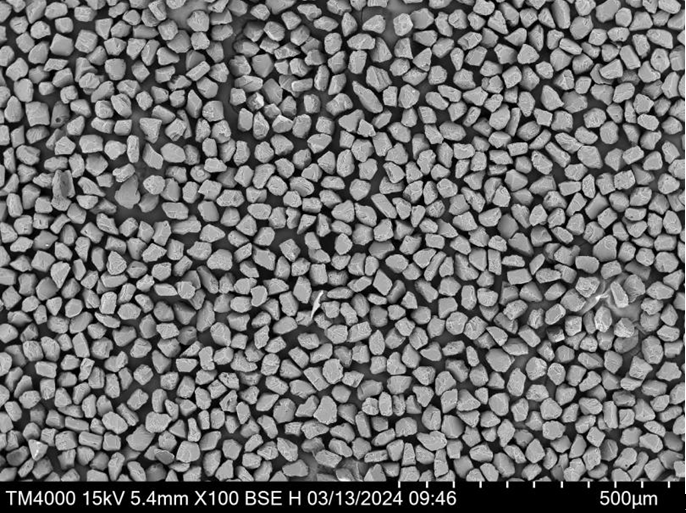
نظرة عامة على المسحوق الكروي
ما هو المسحوق الكروي بالضبط؟
يتكون المسحوق الكروي من جسيمات دقيقة مستديرة الشكل يتم إنشاؤها عادةً باستخدام عمليات مثل الانحلال. هذه المساحيق مطلوبة بشدة بسبب قابليتها الفائقة للتدفق وكثافة التعبئة مقارنة بالجسيمات غير المنتظمة الشكل. سواءً كنت تتحدث عن المعادن أو السيراميك أو البوليمرات، إذا كانت كروية، فهي أكثر كفاءة في العمل بها.
ما أهمية الشكل
إن الشكل الكروي هو أكثر من مجرد شكل جمالي ممتع. إنه المفتاح لتحقيق الطلاء الموحد، والدقة في التصنيع المضاف، وحتى الاتساق في منتجات مثل المستحضرات الصيدلانية. عندما يتعلق الأمر بالتصنيع، فإن التوحيد والقدرة على التنبؤ هما كل شيء. تخيل أن تخبز كعكة بمكونات من جميع الأشكال والأحجام المختلفة - بعض الأجزاء تنضج بشكل أسرع، والبعض الآخر أبطأ، مما يؤدي إلى نتيجة غير متساوية. يضمن المسحوق الكروي أن يكون كل "مكوّن" متجانسًا، مما يؤدي إلى منتج نهائي متفوق.
تركيبة المسحوق الكروي
أنواع المساحيق الكروية وتركيباتها
تتطلب الصناعات المختلفة أنواعًا مختلفة من المساحيق الكروية، ولكل منها تركيبته الفريدة المصممة خصيصًا لتطبيقات محددة. فيما يلي نظرة فاحصة على بعض الأنواع الأكثر شيوعًا:
| نوع المسحوق الكروي | التركيب الأساسي | صفات | التطبيقات |
|---|---|---|---|
| مسحوق التيتانيوم الكروي | التيتانيوم (Ti) | متانة عالية وخفيفة الوزن ومقاومة للتآكل | صناعة الطيران، الغرسات الطبية الحيوية |
| مسحوق الألومنيوم الكروي | الألومنيوم (Al) | موصلية ممتازة وخفيفة الوزن | السيارات، والإلكترونيات، والتصنيع الإضافي |
| المسحوق الكروي النحاسي | النحاس (النحاس) | موصلية حرارية وكهربائية عالية | الإلكترونيات، والمشتتات الحرارية، والطلاءات الموصلة |
| مسحوق كروي من الفولاذ المقاوم للصدأ | الحديد (Fe)، الكروم (Cr)، النيكل (Ni) | مقاومة التآكل والمتانة | الأجهزة الطبية، والسيارات، والأدوات |
| مسحوق النيكل الكروي | النيكل (ني) | مقاومة درجات الحرارة العالية والتآكل | الفضاء، والطاقة، والتصنيع الإضافي |
| مسحوق كروي كروي الكوبالت والكروم | الكوبالت (Co)، الكروم (Cr) | التوافق الحيوي ومقاومة التآكل | الغرسات الطبية وزراعة الأسنان والفضاء والطيران |
| مسحوق التنجستن الكروي | التنجستن (W) | كثافة عالية، مقاومة للحرارة | التدريع الإشعاعي، والفضاء، والدفاع |
| مسحوق الحديد الكروي | الحديد (Fe) | الخصائص المغناطيسية والقدرة على تحمل التكاليف | المواد المغناطيسية، والسيارات، والتصنيع المضاف، والتصنيع المغناطيسي |
| مسحوق الزنك الكروي | الزنك (Zn) | مقاومة التآكل، وخصائص الجلفنة | الجلفنة والصب بالقالب والإلكترونيات |
| مسحوق السيليكون الكروي | السيليكون (Si) | خصائص أشباه الموصلات، ومقاومة الحرارة | الإلكترونيات والخلايا الشمسية والتصنيع الإضافي |
فهم التركيبة وتأثيرها على الأداء
تؤثر تركيبة المسحوق الكروي بشكل مباشر على أدائه في التطبيقات المختلفة. على سبيل المثال، فإن توافق التيتانيوم الحيوي وقوته يجعلانه مثاليًا للغرسات الطبية، في حين أن طبيعة الألومنيوم خفيفة الوزن مثالية لقطع غيار السيارات. ومن خلال فهم هذه التركيبات، يمكن للمصنعين اختيار المسحوق المناسب لاحتياجاتهم الخاصة.
خصائص المسحوق الكروي
الخصائص الرئيسية التي تجعل المسحوق الكروي فريدًا من نوعه
ما الذي يجعل مسحوق كروي التميز في مجال علم المواد المزدحم؟ فيما يلي تفصيل للخصائص الرئيسية:
| الممتلكات | الوصف | ما أهمية ذلك |
|---|---|---|
| قابلية التدفق | قدرة المسحوق على التدفق بسلاسة | ضرورية للتصنيع الإضافي وترسيب الطبقات المتناسق |
| كثافة التعبئة والتغليف | درجة تكتل الجسيمات مع بعضها البعض | تؤدي الكثافة الأعلى إلى مواد أقوى وأكثر اتساقًا |
| مساحة السطح | مساحة السطح الكلية للجسيمات | يؤثر على التفاعلية، خاصة في العمليات الكيميائية |
| النقاء | عدم وجود ملوثات | ضرورية للتطبيقات التي تتطلب موثوقية عالية، مثل الغرسات الطبية |
| الكروية | مدى قرب شكل الجسيم من الكرة المثالية | يحسن ارتفاع الكروية من خصائص التدفق والتعبئة |
المقارنة بين خصائص المساحيق الكروية المختلفة
تُظهر الأنواع المختلفة من المساحيق الكروية هذه الخصائص بدرجات متفاوتة. على سبيل المثال، يتميز مسحوق الألومنيوم الكروي بقابلية تدفق ممتازة وخفيفة الوزن، مما يجعله مثاليًا للتصنيع الإضافي. وفي المقابل، يتميز مسحوق التنغستن بكثافته العالية ومقاومته للحرارة، وهو مناسب للتطبيقات المتخصصة مثل التدريع الإشعاعي.
مزايا المسحوق الكروي
لماذا المسحوق الكروي متفوق في التصنيع
يوفر استخدام المسحوق الكروي العديد من المزايا، خاصةً في الصناعات التي تتسم بالدقة والكفاءة. وإليك السبب:
- انسيابية محسّنة: تتدفق المساحيق الكروية مثل الماء، وتملأ القوالب والتجاويف بسهولة، وهو أمر ضروري في التصنيع المضاف وصب حقن المعادن (MIM).
- كثافة تعبئة أعلى: ولأن الجسيمات تتجمع معاً بإحكام أكبر، فإن المنتج النهائي غالباً ما يكون أكثر كثافة وقوة.
- تشطيب أفضل للسطح: تخلق الجسيمات الكروية أسطحًا أكثر سلاسة، مما يقلل من الحاجة إلى المعالجة اللاحقة.
- الطلاءات الموحدة: في عمليات مثل الرش الحراري، تؤدي المساحيق الكروية إلى طلاءات أكثر اتساقًا، مما يحسن الأداء والمتانة.
- الاتساق في التكوين: يضمن توحيد الجسيمات أن تتصرف كل دفعة من المسحوق بشكل يمكن التنبؤ به، وهو أمر بالغ الأهمية للحفاظ على الجودة في الإنتاج.
دراسة حالة إفرادية: المسحوق الكروي في صناعة الفضاء الجوي
دعونا نلقي نظرة فاحصة على كيفية إحداث المسحوق الكروي لثورة في صناعة الطيران. في إنتاج شفرات التوربينات، على سبيل المثال، يسمح استخدام مسحوق النيكل الكروي بتصنيع أجزاء يمكنها تحمل درجات الحرارة والضغوط الشديدة. يضمن تماثل المسحوق تطابق كل شفرة في التركيب والهيكل، وهو أمر بالغ الأهمية في صناعة يمكن أن يؤدي فيها أصغر عيب إلى فشل كارثي.

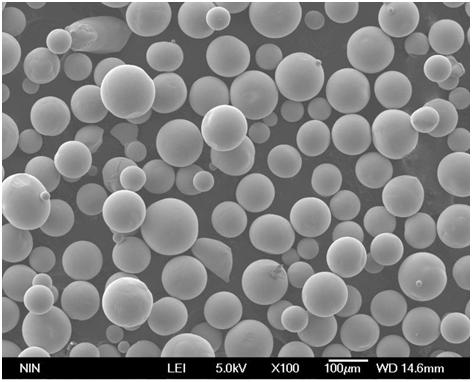
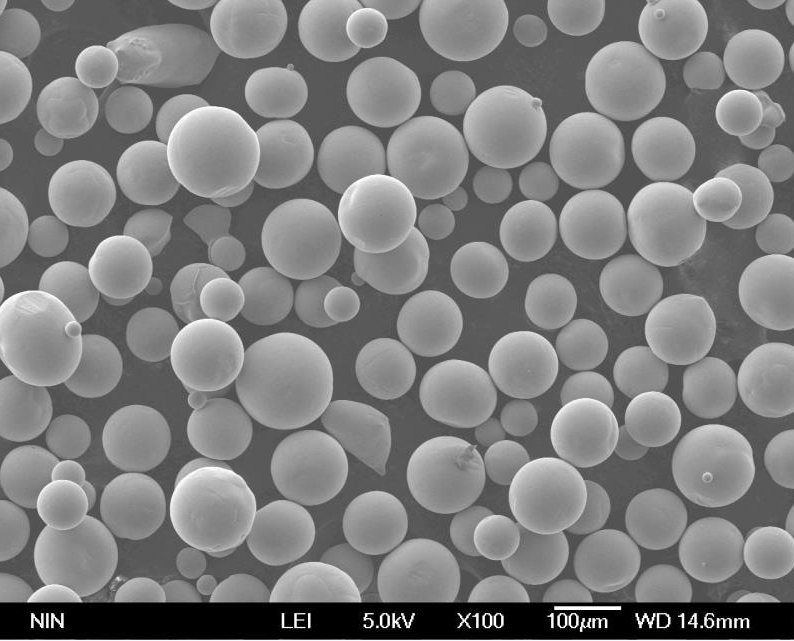
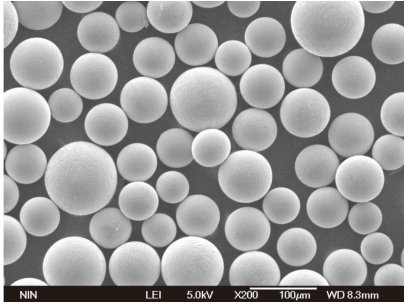
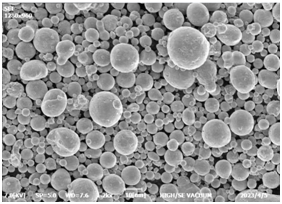
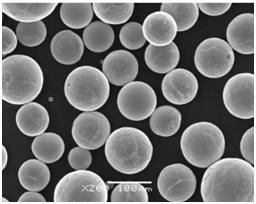
تطبيقات المسحوق الكروي
الاستخدامات الخاصة بالصناعة
الخصائص الفريدة للمسحوق الكروي تجعله لا يقدر بثمن في مختلف الصناعات. إليك كيفية استفادة القطاعات المختلفة من هذه المادة:
| الصناعة | طلب | فوائد استخدام المسحوق الكروي |
|---|---|---|
| الفضاء | شفرات التوربينات، مكونات الصواريخ | نسبة قوة إلى وزن عالية، ومقاومة للحرارة |
| السيارات | مكونات المحرك، والهياكل خفيفة الوزن | انخفاض الوزن، وتحسين كفاءة استهلاك الوقود |
| الطبية | الغرسات والأطراف الصناعية | التوافق الحيوي، والدقة في التصنيع الإضافي |
| الإلكترونيات | الأحبار الموصلة والمكونات | موصلية كهربائية عالية، ودقة في التصنيع الدقيق |
| الدفاع | الدروع والذخائر | كثافة للحماية من المقذوفات، وجودة متسقة |
| الطاقة | المفاعلات النووية والألواح الشمسية | مقاومة درجات الحرارة العالية والكفاءة في تحويل الطاقة |
كيف يُحدث المسحوق الكروي تحولاً في التصنيع المضاف
يُعد التصنيع المضاف، أو الطباعة ثلاثية الأبعاد، أحد أكثر المجالات إثارة حيث تُحدث المساحيق الكروية تأثيرًا كبيرًا. ويُعد تجانس هذه المساحيق وقابليتها للتدفق مثاليين لإنشاء تصميمات معقدة وأشكال هندسية معقدة يستحيل استخدامها في طرق التصنيع التقليدية. على سبيل المثال، في إنتاج الغرسات الطبية المخصصة، يتم استخدام مسحوق التيتانيوم الكروي في إنتاج الغرسات الطبية لإنشاء هياكل تتطابق تماماً مع تشريح المريض، مما يحسن النتائج ويقلل من أوقات التعافي.
المقارنة بين نماذج مختلفة من المسحوق الكروي
مقارنة تفصيلية بين 10 نماذج لمسحوق كروي
عند اختيار المسحوق الكروي لتطبيق معين، من الضروري مقارنة النماذج المختلفة بناءً على خصائصها وتكوينها وتكلفتها. فيما يلي جدول يقارن بين عشرة نماذج مختلفة من المسحوق الكروي، مع تسليط الضوء على ميزاتها الفريدة واستخداماتها المثالية:
| الطراز | المواد | الخصائص | الأفضل لـ | نطاق السعر (لكل كيلوغرام) |
|---|---|---|---|---|
| Ti-6Al-4V | سبائك التيتانيوم | قوة عالية ومتوافقة حيوياً | الغرسات الطبية، والفضاء | $350 – $450 |
| AlSi10 ملغ | سبائك الألومنيوم | خفة الوزن وخصائص حرارية جيدة | السيارات والفضاء والطيران | $100 – $150 |
| 316 لتر | الفولاذ المقاوم للصدأ | مقاومة للتآكل، متينة ومقاومة للتآكل | الأجهزة والأدوات الطبية | $50 – $70 |
| CuNiNi2SiCr | سبائك النحاس | الموصلية الكهربائية العالية، والقوة | الإلكترونيات والمشتتات الحرارية | $200 – $300 |
| CoCrMo | الكوبالت والكروم والموليبدينوم | متوافق حيوياً ومقاوم للاهتراء | زراعة الأسنان وأجهزة تقويم الأسنان وأجهزة تقويم العظام | $400 – $500 |
| NiCr20TiAl | سبيكة نيكل | مقاومة درجات الحرارة العالية والقوة | الطيران والفضاء والطاقة | $600 – $750 |
| حديد2أكسيد الحديد2O3 | أكسيد الحديد | خصائص مغناطيسية، ميسورة التكلفة | الإلكترونيات والمواد المغناطيسية | $20 – $40 |
| دبليو نيفي | تنجستن-نيكل-حديد-نيكل-حديد | عالية الكثافة، واقية من الإشعاع | الدفاع والفضاء والطيران | $500 – $600 |
مواصفات ومعايير المسحوق الكروي الكروي
المواصفات والمعايير الرئيسية للمسحوق الكروي الكروي
عند تحديد مسحوق كروي لمختلف التطبيقات، من الضروري مراعاة المواصفات والمعايير التي تضمن الجودة والأداء. فيما يلي نظرة عامة مفصلة:
| المواصفات | الوصف | المعايير المشتركة |
|---|---|---|
| حجم الجسيمات | قطر جسيمات المسحوق، ويقاس عادةً بالميكرومتر (ميكرومتر) | أستم B330، أيزو 3290 |
| شكل الجسيمات | كروية أو استدارة الجسيمات | أستم B212، أيزو 19530 |
| الكثافة السائبة | كتلة المسحوق لكل وحدة حجم | astm B329، ISO 3953 |
| الكثافة الظاهرة | كثافة المسحوق كما تظهر في الحجم السائب | أستم B212، أيزو 3923 |
| النقاء | النسبة المئوية للمادة الرئيسية مقابل الملوثات | أستم إي 18، أيزو 9001 |
| قابلية التدفق | مدى سهولة تدفق المسحوق عبر قمع أو مزلقان | أستم B213، ISO 4490، ISO 4490 |
| التركيب الكيميائي | العناصر أو المركبات الموجودة في المسحوق | أستم إي 1621، أيزو 6892 |
أحجام ودرجات المسحوق الكروي الشائعة
تتطلب التطبيقات المختلفة أحجامًا ودرجات محددة من المسحوق الكروي. إليك جدول يوضح بعض الأحجام والدرجات الشائعة:
| الحجم (ميكرومتر) | الصف | الاستخدامات النموذجية |
|---|---|---|
| 10 – 20 | جيد | الطلاء الدقيق، والتصنيع الإضافي |
| 20 – 50 | متوسط | مكونات السيارات، الغرسات الطبية |
| 50 – 100 | خشن | التطبيقات الصناعية، التصنيع على نطاق واسع |
الموردون وأسعار المساحيق الكروية
أهم الموردين وتفاصيل الأسعار
إليك لمحة عن بعض الموردين البارزين للمسحوق الكروي وأسعارهم:
| المورد | نوع المسحوق | نطاق السعر (لكل كيلوغرام) | موقع إلكتروني |
|---|---|---|---|
| أميتك | تيتانيوم، ألومنيوم، ألومنيوم | $300 – $500 | ametek.com |
| ساندفيك | فولاذ مقاوم للصدأ، كوبالت | $50 – $200 | الصفحة الرئيسية.ساندفيك |
| هوغاناس | حديد، نيكل، نحاس، نحاس | $100 – $400 | hoganas.com |
| مجموعة ARC | التنجستن، الزنك | $200 – $600 | arc-group.com |
| إليمنتوم | السيليكون، الموليبدينوم | $150 – $400 | elementum3d.com |
عوامل التسعير
يمكن أن يختلف سعر المسحوق الكروي بناءً على عدة عوامل:
- نوع المادة: المواد الممتازة مثل التيتانيوم وسبائك الكوبالت والكروم أغلى من المعادن القياسية مثل الحديد أو الألومنيوم.
- حجم الجسيمات: تميل المساحيق الأدق إلى أن تكون أكثر تكلفة بسبب المعالجة الإضافية المطلوبة.
- النقاء المساحيق عالية النقاء عادةً ما تكون أسعارها أعلى.
مقارنة إيجابيات المسحوق الكروي وسلبياته
مزايا المسحوق الكروي وحدوده
عندما يتعلق الأمر بالمساحيق الكروية، إليك ما تحتاج إلى معرفته عن فوائدها وعيوبها المحتملة:
| أسبكت | مزايا | محددات |
|---|---|---|
| قابلية التدفق | تدفق سلس وفعال للتصنيع | قد تتطلب تقنيات معالجة محددة |
| كثافة التعبئة والتغليف | تؤدي الكثافة الأعلى إلى مواد أقوى | يمكن أن تكون المساحيق الكثيفة أصعب في المعالجة |
| تشطيب السطح | تشطيب سطح فائق بأقل قدر ممكن من المعالجة اللاحقة | ارتفاع التكلفة بسبب متطلبات المعالجة |
| التوحيد | اتساق الجودة والأداء | يمكن أن يكون إنتاج مسحوق كروي موحد مكلفًا |
| التكلفة | اقتصادية للإنتاج بكميات كبيرة | يمكن أن يكون الاستثمار الأولي في المساحيق عالية الجودة مرتفعًا |
مقارنة تفصيلية: المسحوق الكروي مقابل المسحوق غير المنتظم
- مسحوق كروي: يوفر قابلية تدفق وكثافة تعبئة فائقة. مثالية للتصنيع الدقيق والطلاء عالي الجودة. ومع ذلك، يمكن أن تكون المعالجة أكثر تكلفة.
- مسحوق غير منتظم: أرخص عادةً ولكن يمكن أن تؤدي إلى مشاكل في التدفق والتعبئة غير المتناسقة. مناسبة بشكل أفضل للتطبيقات التي تكون فيها الدقة أقل أهمية.
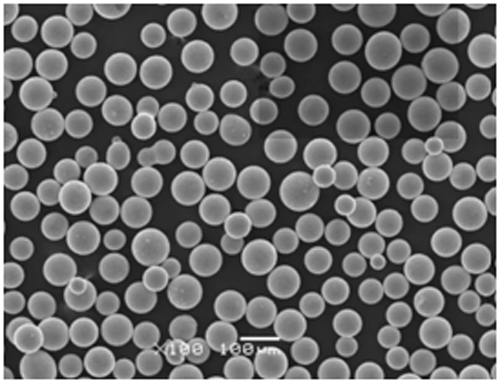
التعليمات
| سؤال | الإجابة |
|---|---|
| ما هو المسحوق الكروي المستخدم في ماذا يستخدم المسحوق الكروي؟ | يُستخدم المسحوق الكروي في مجموعة متنوعة من التطبيقات بما في ذلك التصنيع الإضافي ومكونات السيارات والزراعات الطبية والإلكترونيات. يضمن تجانسها جودة ودقة عالية في هذه المجالات. |
| كيف يتم تصنيع المسحوق الكروي؟ | وعادةً ما يتم إنتاج المسحوق الكروي باستخدام تقنيات الانحلال، حيث يتم تبريد المعدن المنصهر أو المواد الأخرى بسرعة لتشكيل جسيمات كروية. وتشمل الطرق الأخرى الانحلال الغازي والانحلال المائي. |
| ما هي فوائد استخدام المسحوق الكروي في الطباعة ثلاثية الأبعاد؟ | يوفر المسحوق الكروي قابلية تدفق وكثافة تعبئة ممتازة، مما يؤدي إلى ترسيب طبقات أكثر اتساقًا وجودة أفضل للمنتج النهائي في الطباعة ثلاثية الأبعاد. |
| كيف يؤثر حجم الجسيمات على أداء المسحوق الكروي؟ | توفر الجسيمات الأكثر دقة دقة ولمسة نهائية أفضل للسطح ولكن قد يكون التعامل معها أكثر صعوبة. الجسيمات الأكثر خشونة أسهل في التعامل معها ولكنها قد لا تقدم نفس المستوى من التفاصيل واللمسات النهائية. |
| هل يمكن إعادة تدوير المسحوق الكروي؟ | نعم، يمكن إعادة تدوير العديد من أنواع المسحوق الكروي، خاصةً في التصنيع المضاف. ومع ذلك، يجب أن تضمن عملية إعادة التدوير احتفاظ المسحوق بجودته وخصائصه. |
| ما هي التكلفة النموذجية للمسحوق الكروي؟ | تختلف التكلفة بشكل كبير حسب المادة وحجم الجسيمات والنقاء. يمكن أن تتراوح الأسعار من $20 للكيلوغرام الواحد للمواد الشائعة إلى أكثر من $750 للكيلوغرام الواحد للسبائك المتخصصة. |
| أين يمكنني شراء المسحوق الكروي؟ | يمكن شراء المسحوق الكروي من موردين متخصصين مثل Ametek وSandvik وHöganäs وARC Group وElementum. تختلف الأسعار والتوافر بناءً على نوع المسحوق ومواصفاته. |
